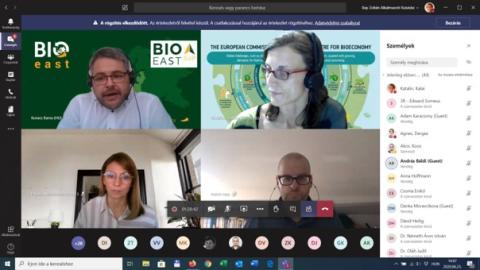
Knowledge sharing for a sustainable and circular bioeconomy

About this good practice
In the bioeconomy, a major barrier is the lack of accessible knowledge among stakeholders, hindering innovation and effective policy implementation, especially at regional and local levels.
The Hungarian Bioeconomy Cluster developed a replicable model to address this: a series of knowledge-sharing sessions to educate and mobilize stakeholders. Launched initially as a webinar series, it promotes understanding and collaboration.
The model includes:
• Multi-session structure: Focusing on various bioeconomy aspects, from high-level strategic insights to practical applications.
• Tailored content: To meet the specific needs of diverse stakeholders, offering informative and actionable content.
• Collaborative approach: Involves multiple partners to foster cross-sector collaboration and integrated bioeconomic strategies.
• Scalable and adaptable: Flexible approach for different regional or national contexts, through webinars, workshops, or conferences.
The "Sustainable and Circular Bioeconomy" webinar series in June 2020 exemplified this model, successfully mobilizing a wide range of stakeholders and facilitating cross-sectoral dialogue on bioeconomic opportunities and challenges.
Beneficiaries:
• participants: agricultural and industrial actors, experts, relevant chambers, research institutes, higher education institutions and ministries
• wide range of sectors: agriculture, forestry and wood, food, energy, waste treatment and processing, the RDI sector and education
Resources needed
Financial resources: Power4Bio H2020 project (“emPOWERing regional stakeholders for realising the full potential of european BIOeconomy”) under Grant Agreement No. 818351
Personnel costs - human resources: 3 persons involved in the organisation of the event at Bay Zoltan Nonprofit Ltd. (part time).
Evidence of success
The event successfully mobilised 45-50 participants from agriculture, industry, research, education, and various sectors like forestry, food, energy, RDI and waste processing. These included experts, chambers, ministries, education institutions from all domestic regions. It also had international participation from Spain, Slovakia, Romania and Croatia. Participants represented a broad geographical and sectoral breakdown, highlighting the collaboration of economic actors across different fields.
Potential for learning or transfer
This practice effectively addresses a common problem: the lack of accessible knowledge in the bioeconomy. Its flexible, scalable model of knowledge-sharing sessions can be adapted to various regional contexts, making it highly relevant and transferable. The approach encourages collaboration among stakeholders, including industry, academia, and government, which is crucial for developing successful bioeconomic strategies. The proven success of the webinar series in Hungary demonstrates its effectiveness, and other regions can replicate this model to enhance stakeholder engagement and foster innovation. This practice aligns with global sustainability goals, making it a timely and valuable tool for advancing bioeconomies in different regions.
Further information
Images
Documents
Website
Good practice owner
You can contact the good practice owner below for more detailed information.
